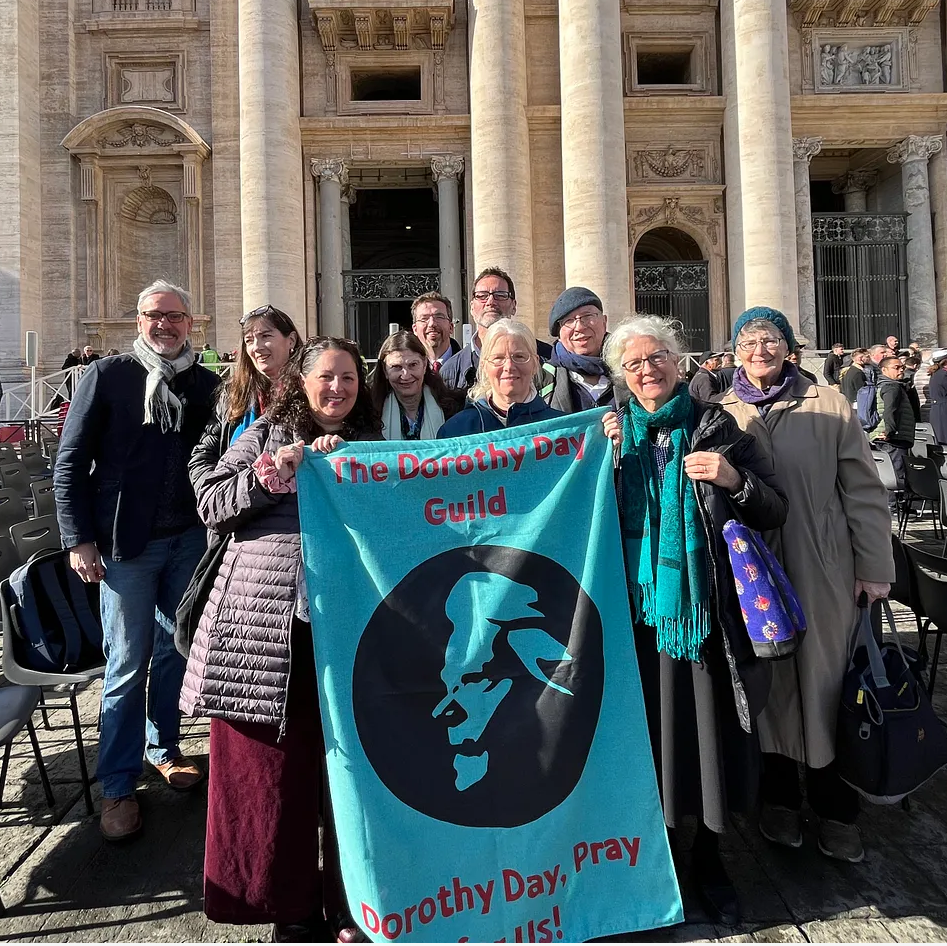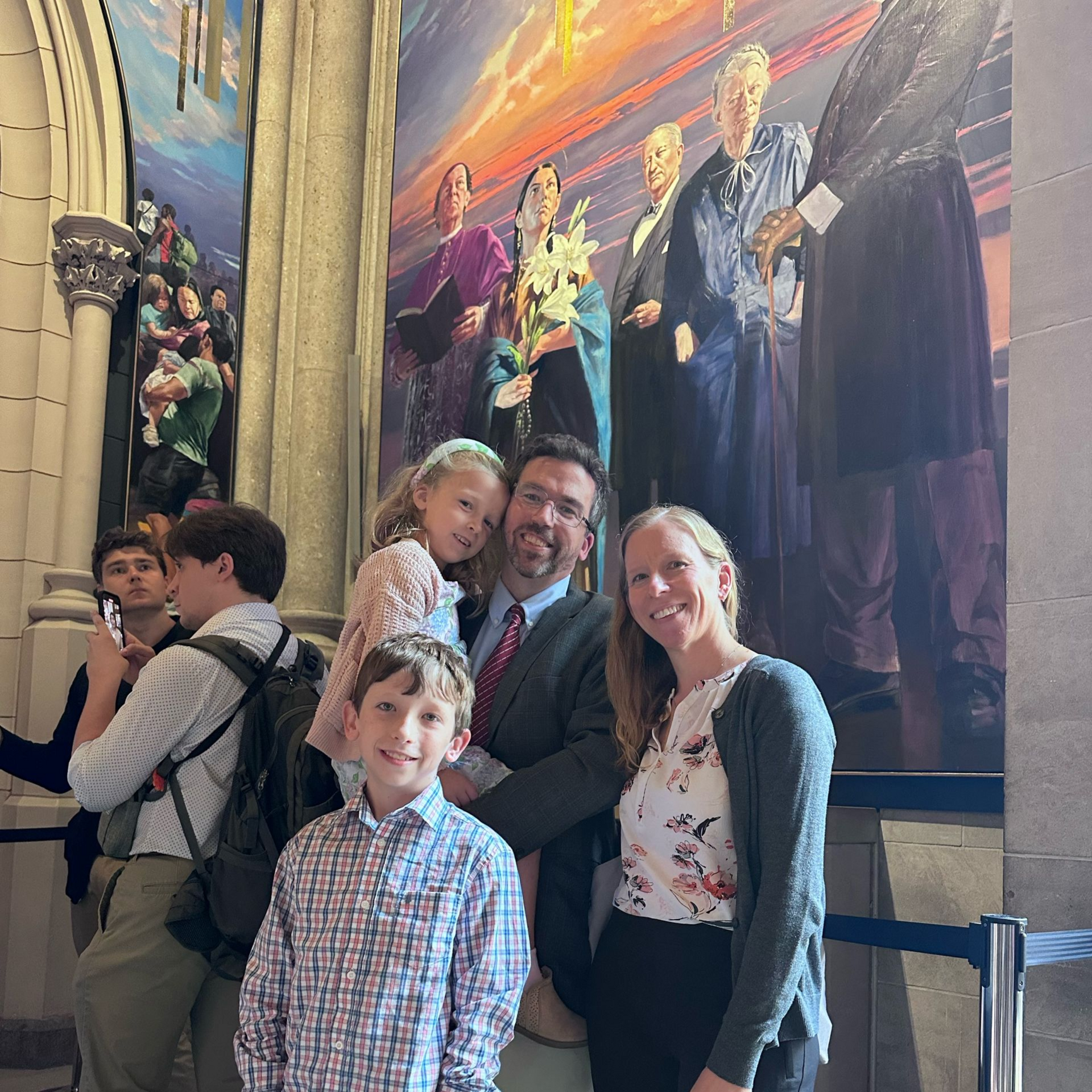A Gift for All of Us
Dispatches is a column dedicated to notable developments from the Dorothy Day Guild. For the community issue of In Our Time, Casey Mullaney reflects on what it was like to share Dorothy Day’s Eucharistic theology with the wider Church.
In April, the Guild received some exciting, last-minute news that peace activist, Catholic Worker, and Guild Board member Martha Hennessy had been invited to speak at the National Eucharistic Congress which was held in Indianapolis this summer. This was the first Eucharistic Congress of this scale to be held in the United States since Martha’s grandmother, Dorothy Day, gave what would be her final public address at the International Eucharistic Congress in 1976. All of us were invigorated by what Dorothy’s Eucharistic theology could contribute to a Church-wide conversation on the social implications of the sacrament.
Dorothy’s devotion to the Eucharist is well-documented: she was a daily communicant who closely identified her reception of Christ’s Body in the sacrament with her membership in the Mystical Body of Christ. Although Dorothy’s pacifism and her solidarity with the poor pre-date her conversion to Catholicism, these teachings on the Eucharist gave her moral commitments a foundation in the life of the Church. As we considered how Martha’s speech might bring this message to a wider audience, my friend and fellow Catholic Worker Renée Roden offered a wise perspective on the gathering. She reminded us that every person who registered for this Congress did so as a seeker. Each of them felt a call to draw close to Christ in the Blessed Sacrament and, in doing so, to gather with other pilgrims on the same journey. Whether or not the audience for Martha’s talk at the Congress was familiar with Dorothy or with the charisms of the Catholic Worker movement, we hoped that God might speak to the Church through Dorothy’s Eucharistic spirituality. Martha’s willingness to bring Dorothy’s message of Gospel nonviolence to a broad audience of participants in the National Eucharistic Congress was an incredible gift to all of us.
To consider the question of peace and the sacraments, we created an opportunity to reflect more deeply in community. Martha, Renée, and our friend James Murphy worked quickly to plan out hospitality during the Congress. Catholic Workers are good at feeding a crowd and talking about ideas, so we decided that we would offer two nights of potluck dinners and clarification of thought in Indianapolis’s Babe Denny Park following Martha’s talk. Friends of the South Bend Catholic Worker made banners and collected picnic supplies, Renée and James selected readings for discussion, and our Ignatian volunteer Jodee Fink assembled packages of materials about the Dorothy Day Guild and her cause for canonization.
On Friday morning, about 5,000 people attended Martha’s address. Our friend Jerry Windley-Daoust made a video and transcript of her convocation available on the Catholic Worker movement website. Martha used her brief time on stage to offer a few of Dorothy’s words on the significance of the Eucharist as well as her own first encounter with the Divine Presence:
As a three year old sitting in the lap of Dorothy, my Granny, I received my first awareness of the presence of God held in her voice and heartbeat while my ear was pressed to her chest. Her devotion to the Eucharist stays with us as we continue to practice the corporal and spiritual works of mercy as Jesus gave of Himself to us. Upon receiving the Eucharist daily, Dorothy held silence for twenty minutes to allow herself to absorb the presence of God within her before returning to her work.
Martha shared what Dorothy had said about the Eucharist in 1976. It happened to be on the thirty-first anniversary of the nuclear bombing of Hiroshima. When she spoke to the gathered assembly of the International Eucharistic Congress in Philadelphia on August 6th, she alerted the participants to the hard teaching that, “Unless we do penance, we will perish. Our Creator gave us life, and the Eucharist to sustain that life. But we have given the world instruments of death of inconceivable magnitude.”
“As members of one body, we are not only inextricably connected to one another, but we accept the responsibility for one another that this intimacy requires.”
In honor of that hard and prophetic teaching, we chose the text of that address, “Bread for the Hungry,” for our first night of clarification of thought. That evening, a group of about twenty Catholic Workers and other pilgrims from across the country gathered together in the park to read and reflect together over pizza, salad, and surplus cookies from the food pantry. I was struck by the group’s joyful fellowship and yet serious engagement with Dorothy’s call for collective repentance for the grave sin of the bomb. Over the years, I have come to recognize this combination as characteristic of Catholic Worker gatherings.
As we explored in our conversation, Dorothy’s call for communal repentance for the violence of the atomic bomb is grounded in the understanding that each one of us is a member or potential member of the Mystical Body of Christ. This understanding granted spiritual vitality to her already deep commitment to pacifism following her reception into the Catholic Church. As members of one body, we are not only inextricably connected to one another, but we accept the responsibility for one another that this intimacy requires. For Dorothy, this was the necessary implication of participation in the sacraments. Accepting the Body of Christ in the Eucharist confirms our membership in the Mystical Body, which confers on us both the weight and the joy of our interdependence.
When I consider the sacramental unity we share, I’m reminded of what is perhaps my favorite passage from Dorothy’s writing, the closing lines to her autobiography, The Long Loneliness. Dorothy writes,
We cannot love God unless we love each other, and to love we must know each other. We know Him in the breaking of bread, and we know each other in the breaking of bread, and we are not alone any more. Heaven is a banquet and life is a banquet, too, even with a crust, where there is companionship.
We have all known the long loneliness and we have learned that the only solution is love and that love comes with community.
It all happened while we sat there talking, and it is still going on.
The Eucharistic community, the heavenly banquet that Dorothy longed for, has in fact come. I’ve seen it hundreds of times. It happened while we sat there talking at Babe Denny park in Indianapolis. It happened in the kitchen in our Catholic Worker house as we said goodbye to our summer volunteer at dinner and sent him off to college with a packet of handwritten notes from each member of our household. It happened at your parish on Sunday morning, and it happened in the stadium when Cardinal Timothy Dolan celebrated mass for fifty thousand hungry souls at the National Eucharistic Congress. The sacrament of the Eucharist is a foretaste of the banquet of heaven, and because of this, any crust we share together in love and in companionship is in some way sacramental. What Dorothy leaves us with in this epilogue is a vision of Eucharistic community as a meal to which all of us are invited, where the violence of armed conflict and economic exclusion are crowded out by the exchange of love and friendship we share in community.
Casey Mullaney is the coordinator for the Dorothy Day Guild, a member of the St. Peter Claver Catholic Worker Community, and an adjunct professor at the University of Notre Dame. And our thanks to Rita Corbin for the use of her illustration, “Tree of Life w. Birds,” as the illustration for
Dispatches.
Share this post





